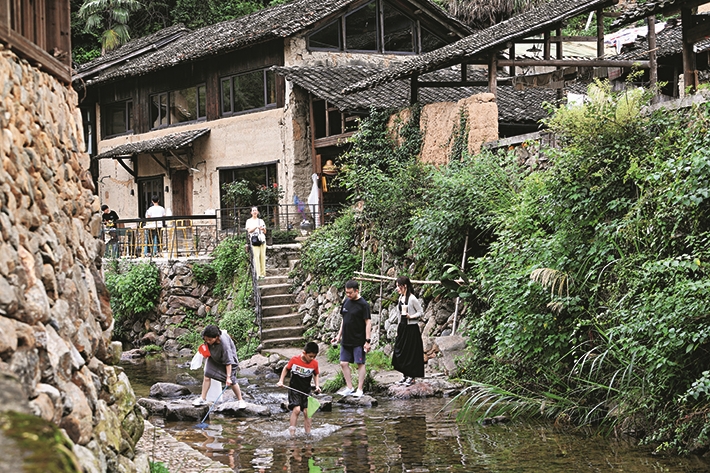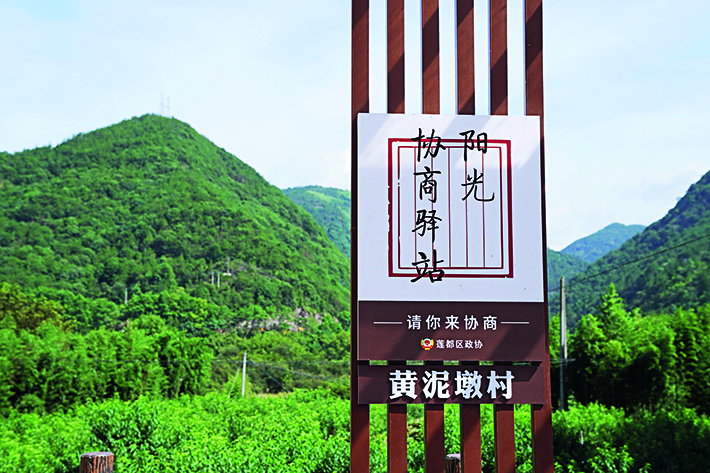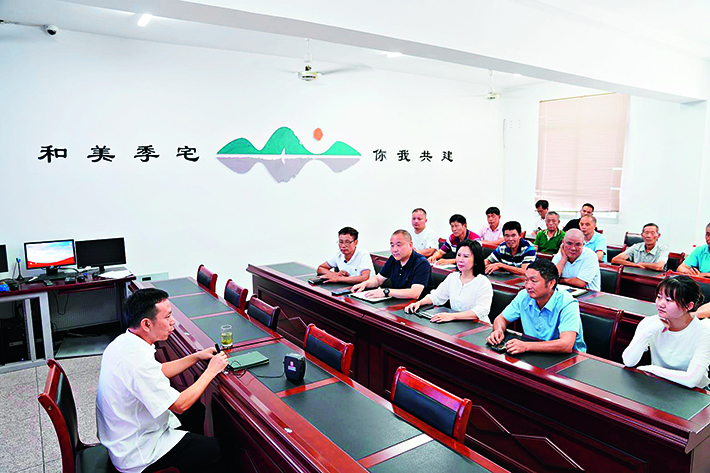|
||||||||||
| Home Nation World Business Opinion Lifestyle ChinAfrica Multimedia Columnists Documents Special Reports |
|
||||||||||
| Home Nation World Business Opinion Lifestyle ChinAfrica Multimedia Columnists Documents Special Reports |
| ChinAfrica |
| Everyone Has a Say |
| Good governance of villages means giving villagers the power to decide instead of making decisions for them |
| By Zhang Juan, Ma Li and Xia Yuanyuan | VOL. 15 September 2023 ·2023-08-30 |

Tourists visit the village of Songzhuang in Sandu Township of Songyang County, Lishui City, Zhejiang Province, on 5 July
On the morning of 3 July, Zhou Hongwei, Party branch secretary of Huangnidun Village, visited Zhou Wenping’s home to hear the family’s suggestions regarding the village’s plan to install more street lamps and upgrade public water pipelines. After their meeting, Zhou immediately headed to another family for their opinions.
In Huangnidun, Huangcun Township of Lishui City, east China’s Zhejiang Province, all issues concerning the immediate interests of its residents must go through surveys like the one Zhou did before decisions were made. “Giving the power to villagers to ensure they decide on village affairs” is the purpose of the survey, according to Zhou.

Photo taken on 7 July shows the signboard of a meeting site for the locals to discuss and decide on village affairs in Huangnidun Village, Huangcun Township, Lishui City, Zhejiang Province
Village self-governance
In early 2014, Zhou Hongwei, a former businessman, returned to Huangnidun and was elected the village Party secretary. At the time, the provincial government rolled out a raft of measures to support greater degree of transparency in rural governance. Zhou and his colleagues put up the village’s financial statements for public review. Instead of garnering applause, the move was snubbed by many who said these documents lacked credibility since the bookkeeping was done by the village officials.
This event prompted Zhou to change his way of dealing with fellow villagers. He spent three months talking with villagers one by one and hearing their complaints and opinions about village governance. Zhou found out that any tension in the relationship between village officials and residents came down to the opaqueness in village affairs. Residents complained that all village affairs, big or small, were decided at village officials’ meetings, excluding the general public from the decision-making process. This “working-behind-closed-doors” approach to governance created unease among villagers. The officials, nevertheless, also had their fair share of grievances - they received no support or trust from fellow villagers even though they worked very hard and sacrificed a lot.
How to bring village officials and residents closer and enhance mutual trust? Zhou believed the answer lied in greater transparency in the management of village affairs. For this purpose, a new practice was introduced: 52 representatives were elected from the 1,000-plus villagers, and they would vote on major village issues in secret ballots. Later, an advisory panel was established and invited to the discussion and voting on village affairs. By contributing their expertise in particular fields, these advisors help villagers to make more informed decisions.
For generations, the people of Huangnidun survived on the yields of their farmland, which generated meagre incomes. The Bishui Creek of the Yanxi River by the village had huge tourism potential, but for its development, the neighbouring farmhouses lying idle and some orange trees and bamboo forests had to be removed. Liu Lianfu was among the most affected, as his homestay business - in which he had invested 200,000 yuan ($27,000) - stood in the way of the development. Demolition and compensation became a huge obstacle for the village’s tourism development project.
Villagers decided to put the issue to a vote, and the project for developing Bishui Creek was passed unanimously. Liu agreed to close his business in support of the project, believing that it will bring more tourists and opportunities. Other villagers followed suit and participated in the development project in various ways.
Collective governance and common prosperity
Songzhuang is a 500-year-old village in Sandu Township of Songyang County, Lishui. Its pristine environment and idyllic scenery have made it a huge attraction for people from near and far, in sharp contrast to its past as a “hollow village,” where the old and young were left behind while prime-age labour migrated to cities for urban jobs.
The transformation started a decade ago. In 2014, Songzhuang was included in China’s list of traditional villages, and received a subsidy of 3 million yuan ($410,000) for its restoration and preservation. Four years later, it got more funding for repair of old buildings. State support, along with joint efforts by local residents and migrants, has given this rural community a new lease of life.
Sun Yingying, an investor from Shanghai, is one of the “new settlers” in Songzhuang. Discerning business opportunities in the scenic region, she leased 18 old houses in the village and started a tourist resort in 2018 by refurnishing the houses into guest rooms, meeting rooms, café, restaurant, bookstore and spa lounges. The investment breathed life back into a dying rural community. During the week-long National Day holiday of 2022, Sun’s resort received 2,000 visits daily on average, a 10-fold increase from three years before.

A legal expert (left) gives a lecture to village mediators in Jizhai Township of Qingtian County, Lishui City, Zhejiang Province, on 7 July
Villager mediators
When Huangfangkou, a village in Jizhai Township, Qingtian County, Lishui, considered building new infrastructure and renovating part of the village, some structures on two families’ premises had to be torn down to give way to the project, and the dismantling and rebuilding were expected to disrupt the life and work of some residents. The plan therefore met with strong resistance from the two families.
A project to improve the living and working environment for villagers must have their support so that it can truly deliver. With this understanding, the township mediation centre invited members of the two families concerned to mediation sessions, which were also attended by village officials, village advisors and fellow villagers. After learning about the need for and benefits of the project, the two families agreed to the demolition of the concerned structures so that the rural roads could be widened.
Today, Jizhai has established a reputation nationwide for this effective mediation model.
Under this model, the parties of a dispute can choose the mediators they trust, and the mediation process is open to the public, said Liu Jinglei, deputy Party committee secretary of Jizhai Township. There are over 100 rural mediators with both experience and legal expertise in Qingtian County. They help villagers to seek solutions when disputes arise, and hence contribute to a harmonious countryside where people feel a strong sense of fulfilment, happiness and security.
| About Us | Contact Us | Advertise with Us | Subscribe |
| Copyright Beijing Review All rights reserved 京ICP备08005356号-5 京公网安备110102005860号 |